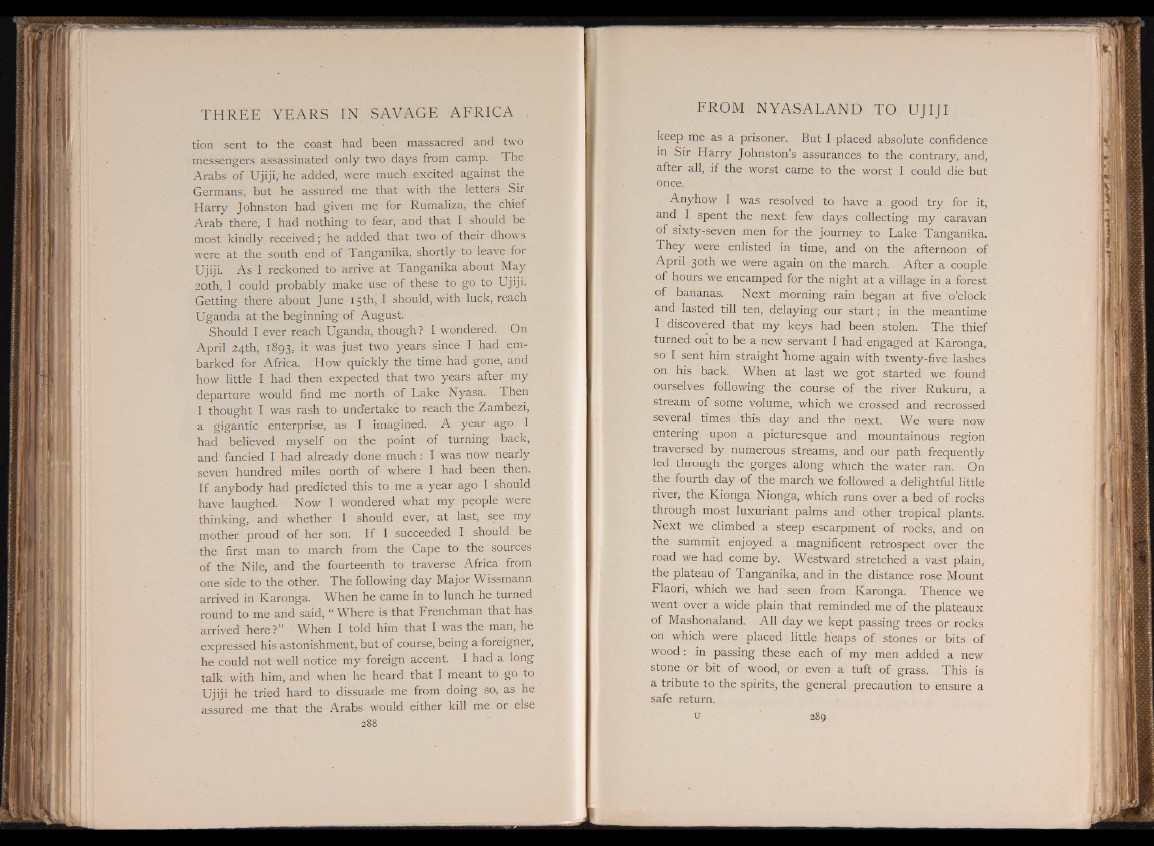
tion sent to the coast had been massacred and two
messengers assassinated only two days from camp. The
Arabs of Ujiji, he added, were much excited against the
Germans, but he assured me that with the letters Sir
Harry Johnston had given me for Rumaliza, the chief
Arab there, I had nothing to fear, and that I should be
most kindly received; he added that two of their dhows
were at the south end of Tanganika, shortly to leave for
Ujiji. As I reckoned to arrive at Tanganika about May
20th, I could probably make use of these to go to Ujiji.
Getting there about June 15th, I should, with luck, reach
Uganda at the beginning of August.
Should I ever reach Uganda, though ? I wondered. On
April 24th, 1893, it was just two years since I had embarked
for Africa. How quickly the time had gone, and
how little I had then expected that two years after my
departure would find me north of Lake Nyasa. Then
I thought I was rash to undertake to reach the Zambezi,
a gigantic enterprise, as I . imagined. A year ago I
had believed myself on the point of turning back,
and fancied I had already done much: I was now nearly
seven hundred miles north of where I had been then.
If anybody had predicted this to me a year ago I should
have laughed. Now I wondered what my people were
thinking, and whether I should ever, at last, see my
mother proud of her son. If I succeeded I should be
the first man to march from the Cape to the sources
of the' Nile, and the fourteenth to traverse Africa from
one side to the other. The following day Major Wissmann
arrived in Karonga. When he came in to lunch he turned
round to me and said, “ Where is that Frenchman that has
arrived here?” When I told him that I was the man, he
expressed his astonishment, but of course, being a foreigner,
he could not well notice my foreign accent. I had a long
talk with him, and when he heard that I meant to go to
Ujiji he tried hard to dissuade me from doing so, as he
assured me that the Arabs would either kill'me or else
288
keep me as a prisoner. But I placed absolute confidence
in Sir Harry Johnston’s assurances to the contrary, and,
after all, if the worst came to the worst I could die but
once.
Anyhow I was resolved to have a good try for it,
and I spent the next few days collecting my caravan
of sixty-seven men for the journey to Lake Tanganika.
They were enlisted in time, and on the afternoon of
April 30th we were again on the march. After a couple
of hours we encamped for the night at a village in a forest
of bananas. Next morning rain began at five o’clock
and lasted till ten, delaying our start; in the meantime
I discovered that my keys had been stolen. The thief
turned out to be a new servant I had engaged at Karonga,
so I sent him straight "home again with twenty-five lashes
on his back. When at last we got started we found
ourselves following the course of the river Rukuru, a
stream of some volume, which we crossed and recrossed
several times this day and the next. We were now
entering upon a picturesque and mountainous region
traversed by numerous streams, and our path frequently
led through the gorges along which the water ran. On
the fourth day of the march we followed a delightful little
river, the Kionga Nionga, which runs over a bed of rocks
through most luxuriant palms and other tropical plants.
Next we climbed a steep escarpment of rocks, and on
the summit enjoyed a magnificent retrospect over the
road we had come by. Westward stretched a vast plain,
the plateau of Tanganika, and in the distance rose Mount
Flaori, which we had seen from Karonga. Thence we
went over a wide plain that reminded me of the plateaux
of Mashonaland. All day we kept passing trees or rocks
on which were placed little heaps of stones or bits of
wood : in passing these each of my men added a new
stone or bit of wood, or even a tuft of grass. This is
a tribute to the spirits, the general precaution to ensure a
safe return.
u 289